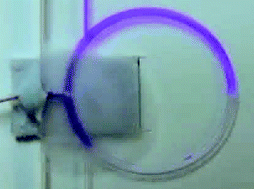Thermally-actuated, phase change flow control for microfluidic systems†
Abstract
An easy to implement, thermally-actuated, noninvasive method for flow control in microfluidic devices is described. This technique takes advantage of the phase change of the working liquid itself—the freezing and melting of a portion of a liquid slug—to noninvasively close and open flow passages (referred to as a phase change valve). The valve was designed for use in a miniature diagnostic system for detecting pathogens in oral fluids at the point of care. The paper describes the modeling, construction, and characteristics of the valve. The experimental results favorably agree with theoretical predictions. In addition, the paper demonstrates the use of the phase change valves for flow control, sample metering and distribution into multiple analysis paths, sealing of a polymerase chain reaction (PCR) chamber, and sample introduction into and withdrawal from a closed loop. The phase change valve is electronically addressable, does not require any moving parts, introduces only minimal dead volume, is leakage and contamination free, and is biocompatible.


 Please wait while we load your content...
Please wait while we load your content...